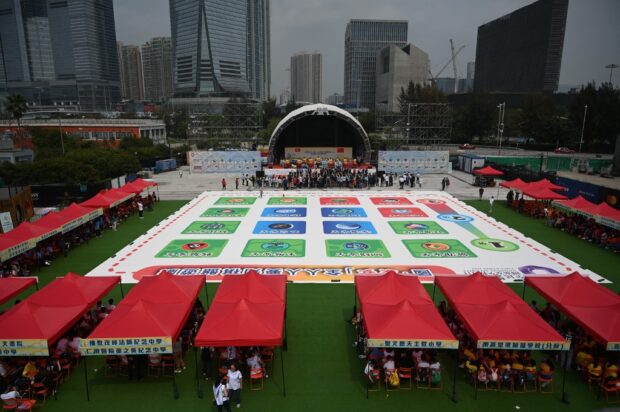Hong Kong tries to show fun side of national security

Children play a giant board game on National Security Education Day in Hong Kong on April 15, 2023. Hong Kong’s sweeping national security law has stifled dissent in the city but on April 15 the government turned to a giant board game in an attempt to promote it to the public. (Photo by Peter PARKS / AFP)
Hong Kong, China — Hong Kong’s sweeping national security law has stifled dissent in the city but on Saturday the government turned to a giant board game in an attempt to promote it to the public.
Outside the cube-shaped Palace Museum, 14 teams faced off in a quiz game for national security education day. It is a concept borrowed from mainland China, which imposed the legislation after massive and sometimes violent pro-democracy protests engulfed the city in 2019.
Mandy Chan, whose daughter was performing in carnival events around the board game, said her child learns about the topic at school.
“It doesn’t bother me much except that since the law was introduced, I have been feeling monitored,” the 47-year-old office clerk told AFP.
“But everything should be alright as long as I don’t do anything wrong.”
Teams participating in the quiz used iPads to answer questions announced by the on-stage host.
The first five to field a correct answer would then send a member to stand on one of the boards of 16 squares, each of which denoted a different aspect of national security.
Opposition groups are now effectively barred from the legislature, the streets cleared of political rallies, and dozens of prominent democrats have been jailed for sedition and subversion or are awaiting trial.
At the launch ceremony for the day’s events, China’s top official on Hong Kong said “destabilising forces” wearing the cloak of democracy and freedom could still return to the city.
“Hong Kong seems peaceful now but in fact some undercurrents are still simmering, and the root of the unrest has not been eliminated,” said Xia Baolong in his keynote speech.
On stage at the carnival, an announcer asked “Is Hong Kong free?”
Children in the audience screamed their response: “Yes!”
Jack, who brought his daughter to the carnival, said the law had turned Hong Kong into a place where people could no longer speak freely.
“You don’t know whether your words would be picked up by people who disagree with you, and that can bring you trouble,” said the 49-year-old IT professional, who gave just his first name.
He said he had warned his primary-school student daughter against discussing “politically sensitive topics”.
“I tell her people have different views on these issues and not everyone will agree with her.”